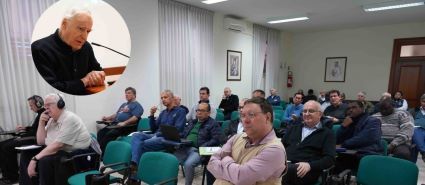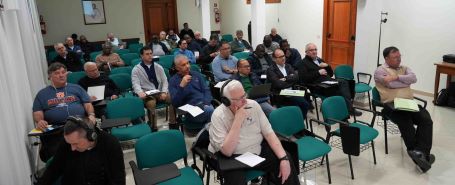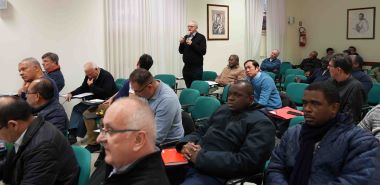Day of Ongoing Formation for the General Council and the Coordinators

The General Council and the Coordinators both the outgoing and newly appointed, began their meeting from the 22nd January 2024 and will end on the 30th January 2024. The morning of the 23rd January, Tuesday was devoted to ongoing formation for the General Council and the Coordinators. Fr Amadeo Cencini, a Canossian priest gave the input for study and reflection. The topic he took up was, “Abuse in Communities of Religious Life: Elements for Analysis and Proposals for a Life without Abuse.”
Fr Cencini spoke with passion and clarity from his vast experience as a professor of Psychology, an Educationist and a practicing Psychotherapist with knowledge and real-life situations both in the Church at large and in Religious life. He indicated that we have always known about Abuse even so unconsciously, and we have sought to hide it both personally and as a Church and as Congregations. Thank God, it is all out in the open for the Good of the Church, for Religious Congregations and humanity at large. While it is all out now, we seek to understand the nature of abuse and we seek to change. There is no turning back now.
Very powerfully he indicated that the most abused and the First to be abused is God. It is God who calls us to be his and we abuse him.

Fr Cencini then presented the various kinds and types of abuse in Religious life: Sexual with regard to the vow of chastity; Power and Authority with regard to the vow of obedience; Finance and possessions with regard to the vow of poverty. He also highlighted other areas of abuse: the liturgy, the Word of God, the Sacraments, the Pastoral, the Spiritual, the conscience, etc.
Fr Cencini then took up the various responses to abuse in the community explaining how there is a real danger of being defensive and reductive today on this matter. He further showed how while there is a very small minority of those who are real abusers, there is an equally small minority of those who are truly virtuous while the vast majority of men and women in religious life today are mediocre, while they do not abuse, they are neither hot or cold, neither passionate nor interested, indifferent, apathetic, cynical who live chastity and the vowed life as a burden. He strongly emphasised how the transgressions of a few results in the mediocrity of the many which is very visible today in the Church and in Religious life. Many wash their hands. Scandal affects all, all are responsible! He regretted the culture of mediocrity in the Church today.
Mediocrity itself is a scandal and a perversion, a danger because it is contagious, it deforms the sense of vocation and calling. He regretted the loss of creativity today in religious life. He went on to show the signs of mediocrity in the Church and Religious life today through defensive and irresponsible behaviour in relation to the abuser and the abused. There is a general lack of attention to the pain of the victim and “Magisterium of the victim.” The Victim has much to teach us if we are willing to listen and the voice of the victim must become a necessary part of the formation programs in religious life if we are to imagine a Religious community sensitive and compassionate. The Magisterium of the Victim is the call to learn from the suffering of the victim. There is however a strong resistance to do the right and to the truth, to understand the victim and instead very often the victim, the abused is made to look like the one who caused the abuse in the first place, a reversal of roles.
Mediocrity has to do with a climate of saturation that is spreading among religious communities, namely, “I have had enough of this!” There is also a lack of attention to the problem in formation and the pastoral life.
This is a difficult moment for all of us but it is a moment of GRACE if we can find in this moment a call to conversion and change. There is a call to live the virtue of Vigilance with respect to the Mystery of the Other, the Other as Holy Ground.
In the Second Session, Fr Cencini dealt with the Emotive process of an abusive personality. He showed how there is the abuser latent in each one and indicated ways and means to recognise this in oneself and in others. He pointed out different indicators to recognise an abusive personality. He analysed the theology of the abuser or the image of God that the abuser espouses which results then in forms of narcissistic clericalism. This can be in the Liturgical sphere: The abuse of the liturgy, the Word of God, the Sacraments etc; The abuse in the Pastoral Sphere: I am the Centre of all pastoral work; in the Relational Sphere, I am the centre of all relationships; the Social/Ecclesial Sphere: careerism in the Church, seeking positions of authority.
The call is to embrace a Theology not of the mere Omnipotence of God (All Powerful) but of the Omnipotence of Love, A God of Love who sacrifices for the other as evidenced on the cross. The Cross is the presence of the Omnipotence of Love and not of power and might as explained by St Paul in the scandal of the Cross in 1 Corinthians.

Fr Cencini then answered various questions posed by the confreres. The two sessions were opened to the Community of San Alfonso and also to the confreres from Italy via webinar.
Fr Rogério Gomes, Superior General, finally thanked Fr Cencini for his very honest, provocative and challenging reflections.
Joseph Ivel Mendanha, C.Ss.R.

